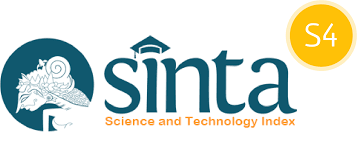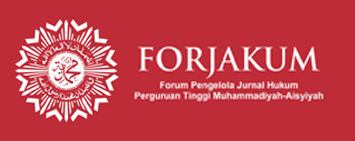Peran Negara dalam Melindungi Hak-Hak Konstitusional Anak Terlantar di Indonesia
DOI:
https://doi.org/10.18196/mls.v3i3.14323Keywords:
abandoned children, constitutional rights, child protectionAbstract
Abandoned children are children whose parents for some reason neglect and or are unable to carry out their obligations so that their physical, spiritual and social needs are not met. This study aims to identify and examine the function and role of the state in implementing and protecting the constitutional rights of neglected children in Indonesia. This type of research is a normative research with a statutory approach. The data collection technique is through literature review, and analyzed using qualitative descriptive methods. The results of the study indicate that the function and role of the state in protecting the constitutional rights of neglected children is sufficient in accordance with the 1945 Constitution of the Republic of Indonesia Article 34 paragraph (1) where the State through the Ministry of Social Affairs provides programs related to facilities and infrastructure related to neglected children in order to get their rights, namely Through the Child Social Welfare Program (PKSA) in these programs many benefits are felt by the abandoned children such as getting a place to live, education, access to health, cash assistance, clothing, housing, and food. However, in the process of implementing child protection, there are too many legal rules that regulate so that it gives rise to multiple interpretations related to these legal rules, especially to the general public. Regarding the fulfillment of children's rights, there is a need for supervision regarding the Welfare Program provided by the Government to neglected children so that the provision of assistance is carried out evenly and on target.
References
Buku
Bagong Suyanto, Bagong, Suyanto. (2013), Masalah Sosial Anak Edisi Revisi, Jakarta: Prenadamedia Group.
Irfan Fachruddin, (2004), Pengawasan Peradilan Administrasi Terhadap Tindakan Pemerintah, Bandung: Alumni.
I. Wibowo, (2000), Negara dan Masyarakat :Berkaca Dari Pengalaman RRC, Jakarta: Gramedia.
Jimly Asshiddiqie, (2012), Hukum Tata Negara & Pilar-Pilar Demokrasi, Jakarta: Sinar Grafika.
Maidin Gultom, (2010), Perlindungan Hukum Terhadap Anak dalam Sistem Peradilan Pidana Anak di Indonesia, Bandung: Refika Aditama.
Mardi Candra, (2017). Aspek Perlindungan Anak Indonesia Analisis Tentang Perkawinan Di Bawah Umur. Jakarta: Prenadamedia Group.
Peter Mahmud Marzuki, (2010), Penelitian Hukum, Jakarta: Kencana Prenada.
Rezah, Nurul Qamar dan Farah Syah. (2015). Ilmu Kenegaraan (Staatswissenschaft). Jakarta: Mitra Wacana Media.
Sjachran Basah, (1994), Ilmu Negara, Bandung : Citra Aditya Bhakti.
Jurnal
Aan Aswari, (2018), Harmonisasi Hukum Hak Untuk Dilupakan Bagi Koran Digital Terhadap Calon Mahasiswa di Makassar, 2018, Jurnal Ilmu Hukum, 20.
Anna Syahra & Mulati, (2018), Aspek Hukum Tangung Jawab Negara Terhadap Perlindugan Anak Terlantar Ditinjau Dari Pasal 34 Ayat 1 Undang-Undang Dasar Negara Republik Indonesia Tahun 1945, Jurnal Hukum Adigama, 1 (1)
Direktorat Jenderal Rehabilitasi Sosial Kementrian Sosial Republik Indonesia, (2018), Laporan Kinerja Program Rehabilitasi Sosial Anak (PKSA)
Irwan Sandi, (2016), Implementasi Kebijakan Perlindungan Anak Terlantar Pada Dinas Sosial Provinsi Sulawesi Tengah, e Jurnal Katalogis, 4 (5).
Rosmi Darmi, (2016), Implementasi Konvensi Hak Anak Terkait dengan Perlindungan Anak yang Berhadapan dengan Proses Hukum, De Jure, 16 (4).
Sukadi, I, (2013), Tanggung Jawab Negara Terhadap Anak Terlantar Dalam Operasionalisasi Pemerintah Di Bidang Perlindungan Hak Anak, Journal De Jure, 5 (2).
Undang-Undang
Undang-Undang Dasar Negara Republik Indonesia 1945.
Undang-Undang Nomor 35 Tahun 2014 Tentang Perubahan Atas Undang-Undang RI Nomor 23 Tahun 2002 Tentang Perlindungan Anak.
Undang-Undang RI Nomor 39 Tahun 1999 Tentang Hak Asasi Manusia.
Undang - Undang RI Nomor 11 Tahun 2009 Tentang Kesejahteraan Sosial.
Undang-Undang Nomor 11 Tahun 2011 Tentang Sistem Peradilan Anak.
Undang-Undang RI Nomor 4 Tahun 1979 Tentang Kesejahteraan Anak.
Keputusan Presiden RI No. 36 Tahun 1990 Tentang Pengesahan Convention on the Right of the Child (Konvensi tentang hak-hak anak).
Website
Website Resmi Kemensos https://kemensos.go.id/komitmen-kemensos-bantu-anak-anak-di-kondisi-covid-19-melalui-progresa#:~:text=Berdasarkan%20Data%20Terpadu%20Kesejahteraan%20Sosial,AMPFS%20dan%2064.053%20Anak%20Terlantar, diakses tanggal 7 juli 2021.
Website Resmi KEMENPPA https://www.kemenpppa.go.id/index.php/page/read/29/2738/angka-kekerasan-terhadap-anak-tinggi-di-masa-pandemi-kemen-pppa-sosialisasikan-protokol-perlindungan-anak. diakses pada tanggal 10 juli 2021.
Downloads
Published
Issue
Section
License
Copyright
Authors who publish papers in this journal agree to the following terms:
Authors retain copyright. Authors are permitted to copy and redistribute the journal's published version of the work non-commercially (e.g., post it to an institutional repository or publish it in a book)
Authors are permitted and encouraged to post their work online (e.g., in institutional repositories or on their website) prior to and during the submission process, as it can lead to productive exchanges, as well as earlier and greater citation of published work (See The Effect of Open Access).
This journal is using Attribution-NonCommercial-ShareAlike 4.0 International. You are free to:
- Share — copy and redistribute the material in any medium or format
- Adapt — remix, transform, and build upon the material
The licensor cannot revoke these freedoms as long as you follow the license terms, which include the following:
- Attribution — You must give appropriate credit, provide a link to the license, and indicate if changes were made. You may do so in any reasonable manner, but not in any way that suggests the licensor endorses you or your use.
- NonCommercial — You may not use the material for commercial purposes.
- ShareAlike — If you remix, transform, or build upon the material, you must distribute your contributions under the same license as the original.
- No additional restrictions — You may not apply legal terms or technological measures that legally restrict others from doing anything the license permits.
Creative Commons Attribution-NonCommercial-ShareAlike (CC BY-NC-SA)

This work is licensed under a Creative Commons Attribution-NonCommercial-ShareAlike 4.0 International License.



